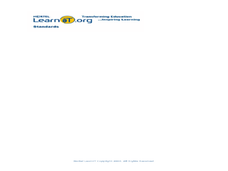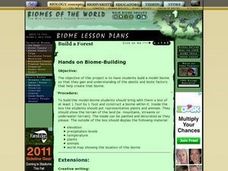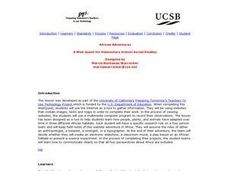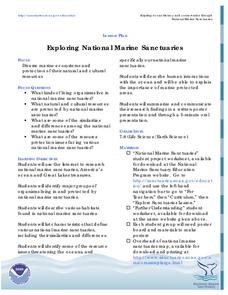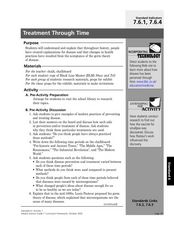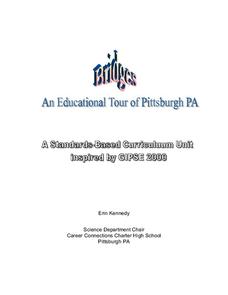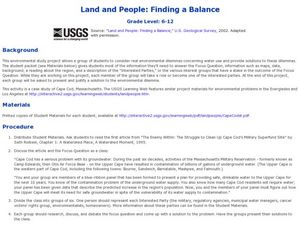Curated OER
Alternative Energy Sources
Young scholars recognize that people have various opinions on the use of renewable energy.In this renewable energy lesson, students research to find the best uses of renewable energy. Young scholars create an original design for a group...
Curated OER
A Generation that Cares: Saving our Environment!
Students discover the dangers posing our environment. In this environmental awareness lesson, students investigate problems like global warming and pollution and discuss ways their generation can solve these issues. Students research...
Curated OER
Exploring the Natural World of the Balkan Peninsula
Students explore the different habitats in the Balkan peninsula. In this ecology lesson, students research about a species and create a 3D diorama of its environment. They present project in class and share their research findings.
Curated OER
Hands on Biome-Building: Build a Forest
Students explore Earth science by identifying environmental factors. For this biome lesson, students discuss the importance of a functioning ecology and design a biome diorama. Students utilize images of trees and plants which represent...
Curated OER
Column Chromatography
Students research the mechanics of liquid chromatography. In this technology instructional activity, students calculate the concentration of unknown samples. They write a report about their research and lab results.
Curated OER
Taking a Stand: Pros and Cons of Forest Fires
Learners explain the components of fire, explain how forest fires impact man and the environment, analyze data in order to recognize areas that are at risk for forest fires, make recommendations based on research.
Curated OER
African Adventures
Students access the Internet to gather information. They record their observations of African habitats. They create either an electronic slideshow or mural to present a science experiment.
Curated OER
One Giant Leap
Students brainstorm important scientific advancements of the twentieth century. They examine the implications of the completion of the first rough draft of the human genome on society. They research a selected scientific advancement of...
Curated OER
Building a Volcano
Students research volcanoes and then build one out of salt dough. Before the final step is completed, they find main ideas about volcanoes, write sequential steps to building, use correct grammar, to gain knowledge about them. There is...
Curated OER
Exploring National Marine Sanctuaries
Learners research marine ecosystems by creating class presentations. In this oceanography lesson, students research the different locations of marine sanctuaries by identifying them on a transparency map in class. Learners create...
Curated OER
Park Brochures
Sixth graders investigate natural environments by researching national parks. In this brochure making lesson, 6th graders explore a specific national park and research it's information by utilizing the web. Students create travel...
Curated OER
Treatment Through Time
Seventh graders explore how disease prevention and treatment changed throughout history. For this life science lesson, 7th graders create a classroom exhibit about this topic. They present their project to visitors.
Curated OER
Genetic Ethics Debate
Students select topics relating to bioethical questions which they research and debate. They, in groups, select topics and are given two to three weeks to research their topics, taking advantage of their school libraries and local public...
Curated OER
Cool! Awesome! What is it?
Learners work in small groups to brainstorm hypotheses about mysterious science photographs, read and interpret answers to the science photographs, cooperatively develop a set of clues for the images and develop their own science photo...
Curated OER
Genetic Mind Reader Review Game
Students review some important concepts and terms relevant to the Human Genome Project and genetic research. The game is played like a mind reading session between two teams.
Curated OER
The ABC's of DNA
Young scholars describe genetics as if they were explaining it to a young child. After reading an article, they discover new discoveries in the human genome project. Using the internet, they research a pair of genetic terms and develop...
Curated OER
Bridges
Students are introduced to the different types, designs and nature of bridges. They observe a historical look at the bridges in and around the Pittsburgh area through a video presentation. Connections are made between science and...
Curated OER
A Growing Success
Students create a multimedia presentation as a culmination of a plant unit. In this hyperstudio lesson, students research from assigned sites and create a Hyperstudio stack. Students write a cinquain.
Curated OER
Land and People: finding a Balance
Young scholars discuss "The Enemy Within: The Struggle to Clean up Cape Cod's Military Superfund Site" by Seth Rolbein by figuring out how there should be safe groundwater. For this science lesson, students pretend to be an interested...
Curated OER
Hands on Biome-Building
Young scholars explore Earth science by participating in an environment activity. In this biome lesson, students discuss the importance of a healthy ecology in order to sustain life, both animal and plant. Young scholars utilize a...
Curated OER
Savanna Hands-On Biome Building
Fifth graders participate in an interdisciplinary project related to the Savanna biome. In this biome building lesson, 5th graders display the elements of the Savanna biome such as the geography, animals and plants, and precipitation...
Curated OER
WHALES: GIANTS OF THE DEEP
Students study humpback whale migrations, feeding, social organization, population, scientific investigations and compare humpback whales , research to explore a specific type of whale, and create their own replica of a whale.
Curated OER
Egypt's golden Empire
Students explore many of the key scientific and technological contributions made by the ancient Egyptians. Researched data is presented to the entire group.
Curated OER
Magnificent Microscopes
Students use a microscope in a series of activities that are designed to help them explore the "invisible world" and make meaningful microscopic discoveries and learn the importance of the microscope as a tool in science and research.



